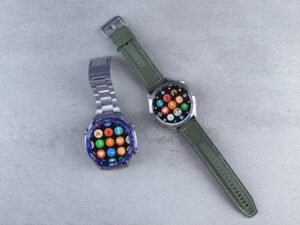Why You Should Care in 2025
The smartwatch world split this year into specialists (outdoor monsters, marathon-class battery champs) and generalists that double down on health sensors, AI coaching and tighter phone integration. We tested 40+ models released through June 26 2025, cross-checking independent data from TechRadar, Android Authority, MacRumors and long-term user reports to surface the ten watches that truly stand out.
How We Picked
| Must-have | Requirement |
|---|---|
| Modern silicon | Latest-gen Wear OS, watchOS 10/11, HarmonyOS 4, or Garmin/Zepp stacks |
| Battery | ≥ 24 h real-world with screen AOD or 7 days in “smartwatch mode” |
| Health suite | HR + SpO₂ + sleep + stress/HRV at minimum |
| Value | Clear advantage versus rivals in the same price band |
Snapshot-Ranking (Jump straight to your tier)
| Rank | Watch | Price* | Why It Stands Out |
|---|---|---|---|
| 1 | Apple Watch Ultra 2 | $799 | Brightest screen & rugged dive-ready shell |
| 2 | Apple Watch Series 10 | $399 | Slimmer 2-size design, bigger curved OLED |
| 3 | Samsung Galaxy Watch Ultra | $699 | Monster battery, Wear OS 5 & titanium frame |
| 4 | Samsung Galaxy Watch 6 Classic | $349 | Rotating bezel & polished design |
| 5 | Google Pixel Watch 2 | $349 (often $199) | Pure Wear OS + Fitbit Premium health |
| 6 | Garmin Venu 3 | $449 | 14-day battery, AMOLED & wheelchair mode |
| 7 | OnePlus Watch 2 | $299 | Dual-chip Wear OS with 53-hour real use |
| 8 | Mobvoi TicWatch Pro 5 | $349 (often <$250) | Dual-display & 80-h battery |
| 9 | Amazfit Active 2 | $99 | Five-star budget star with 10-day life |
| 10 | Huawei Watch 5 | $232 | New X-Tap sensor & 11-day stamina |
*Street prices, June 2025; deals fluctuate.
1. Apple Watch Ultra 2 — Rugged King for iPhone Users
watchOS 11 + S9 SiP, 36 h battery, 3 000-nit OLED and legit dive computer features make Ultra 2 the most capable Apple wearable yet. Reviewers still rank it best overall despite Series 10’s prettier screen.
Pros
- Titanium shell, 100 m water-res, MIL-STD drop tests
- Dual-frequency GPS rivals Garmin accuracy
- Double-Tap gesture & on-device Siri
Cons
- iPhone-only; bulky for narrow wrists
- $799 starting price
Best for: outdoor athletes, divers, marathoners who live in Apple’s ecosystem.
2. Apple Watch Series 10 — Everyday Powerhouse
Apple shrank the chassis while expanding the display 30 % and added fast-charge coils (80 % in 30 min).
Pros: Curved OLED, lighter titanium option, ECG & sleep-apnea alerts
Cons: 20 h battery at best; still premium-priced
Perfect fit: students, professionals and casual exercisers who want iOS deep-integration without Ultra bulk.
3. Samsung Galaxy Watch Ultra — Android’s New Flagship
A fresh “cushion” design brings a bigger Super AMOLED, Exynos W1000 chip and 100 h battery promise.
Ideal for: Android users craving Ultra-style ruggedness and advanced body-composition tools.
Watch-outs: heavy for sleep, optimized for Samsung phones.
4. Samsung Galaxy Watch 6 Classic — Rotating-Bezel Charm
TechRadar calls the 47 mm Classic a “statement watch” with a tactile bezel and refined Wear OS 4.
- Pros: slick design, ECG, temperature sensor, Samsung Wallet
- Cons: 24 h battery if AOD on
Best for: style-first Android owners who still want serious health features.
5. Google Pixel Watch 2 — Minimalist Wear OS with Fitbit DNA
A six-month review praises faster charging and excellent sleep tracking, though some Fitbit features hide behind a paywall.
- Pros: Pebble design, Google Assistant & maps, stress score
- Cons: One-day battery, only 41 mm size
Use-case: Pixel phone users or anyone who values Google apps over battery longevity.
6. Garmin Venu 3 — Fitness & Battery Balance
A 14-day smartwatch mode and 26-hour GPS paired with an AMOLED screen wowed reviewers calling it a “true Apple Watch rival.”
- Pros: Meditation coach, wheelchair tracking, no subscription fees
- Cons: Pricey & chunky compared with Wear OS rivals
Great for: athletes needing deep metrics without losing smartwatch niceties.
7. OnePlus Watch 2 — Multi-Day Wear OS Champ
Android Authority clocked 53 h with AOD on; a dual-chip design swaps to RTOS for standby.
Pros: 1.43-in 466 × 466 OLED, 5 ATM, rapid VOOC charge (1–100 % in 60 min)
Cons: OHealth app still limited; large 47 mm case
Who it suits: Android users who hate nightly charging.
8. Mobvoi TicWatch Pro 5 — Dual-Display, 80-Hour Endurance
TechRadar calls it “an outstanding Pixel Watch alternative,” crediting the Snapdragon W5+ chip and dual-layer screen.
- Pros: EPA-style monochrome layer saves juice, 32 GB storage
- Cons: No LTE option, dated companion app
Ideal for: weekend hikers, battery obsessives.
9. Amazfit Active 2 — $99 Giant-Killer
A five-star TechRadar review lauds its AI coach, 2 000-nit AMOLED and 10-day stamina—unheard-of at this price.
- Pros: Alexa-like voice control, stainless bezel, 164 sport modes
- Cons: NFC costs extra, no third-party app store
Best for: first-time smartwatch buyers or teens.
10. Huawei Watch 5 — Luxury Design, Long Life
Latest leak confirms an X-Tap multispectral sensor plus 11-day battery in titanium or steel. HarmonyOS is smooth but app-light.
- Pros: 1.5-in LTPO OLED, over 100 workout modes, Sunflower GPS
- Cons: Limited third-party apps, no contactless pay, no voice assistant
Who should buy: health-focused users outside the U.S. who value battery and build above apps.
Spec Sheet at a Glance
| Watch | OS | Screen | Battery (claimed) | Key Strength |
|---|---|---|---|---|
| Apple Watch Ultra 2 | watchOS 11 | 1.92″ OLED 3 000 nits | 36 h | Rugged + dive features |
| Apple Watch Series 10 | watchOS 11 | 1.7/1.9″ curved OLED | 20 h | Slim everyday iOS watch |
| Galaxy Watch Ultra | Wear OS 5 | 1.5″ AMOLED | 100 h | Android rugged flagship |
| Galaxy Watch 6 Classic | Wear OS 4 | 1.3/1.5″ AMOLED | 40 h | Rotating bezel design |
| Pixel Watch 2 | Wear OS 4 | 1.2″ OLED | 30 h | Fitbit integration |
| Garmin Venu 3 | Garmin OS | 1.4″ AMOLED | 14 d | Sports + lifestyle |
| OnePlus Watch 2 | Wear OS 4 | 1.43″ OLED | 53 h real | Dual-chip stamina |
| TicWatch Pro 5 | Wear OS 4 | 1.43″ OLED + FSTN | 80 h | Dual-display |
| Amazfit Active 2 | Zepp OS 3 | 1.32″ AMOLED | 10 d | Budget superstar |
| Huawei Watch 5 | HarmonyOS 4 | 1.5″ LTPO | 11 d | Luxury + sensors |
How to Choose the Right Smartwatch
- Match OS & phone – Apple → watchOS; Samsung/Android → Wear OS or proprietary (Garmin/Zepp).
- Battery vs. features – AMOLED + heavy GPS drains fast; dual-chip or transflective displays stretch days.
- Health depth – Evaluate ECG, skin-temp, HRV & sleep scoring if you care about holistic wellness.
- Ruggedness – Need dive mode or back-country GPS? Pick Ultra-style models with EN13319 or MIL-STD ratings.
- App ecosystem – watchOS boasts the richest store; Wear OS catching up; others rely on built-ins.
FAQ (Featured-Snippet Ready)
Q1. What’s the best overall smartwatch in 2025?
Apple Watch Ultra 2 tops expert charts for its unmatched screen brightness, dual-frequency GPS and dive certification—provided you own an iPhone.
Q2. Which smartwatch offers the longest battery life without ditching smart features?
Mobvoi’s TicWatch Pro 5 hits around 80 hours thanks to its secondary low-power screen and Snapdragon W5+ chip.
Q3. Are there good sub-$100 options?
Yes—Amazfit Active 2 delivers 10-day stamina, AI coaching and 2 000-nit brightness for just $99.
Q4. Which watch is best for serious fitness tracking?
Garmin Venu 3 balances a bright AMOLED with Garmin’s pro-grade GPS and training metrics, lasting up to 14 days.
TL;DR & Buying Tip
- Adventure & iPhone: Apple Watch Ultra 2
- Everyday iOS: Apple Watch Series 10
- Flagship Android: Samsung Galaxy Watch Ultra
- Best fitness: Garmin Venu 3
- Budget hero: Amazfit Active 2
Next step: Check live prices via our Amazon or brand-store links above—or read our deep-dive on Battery-Life Hacks for Wear OS to stretch your new watch even further.







